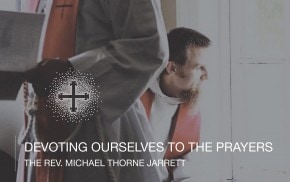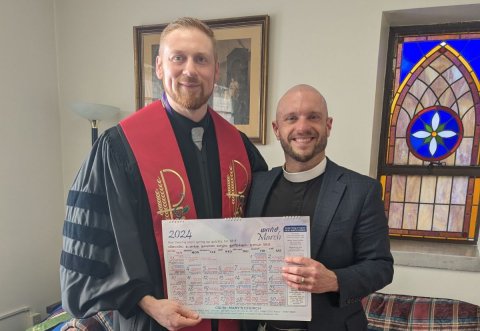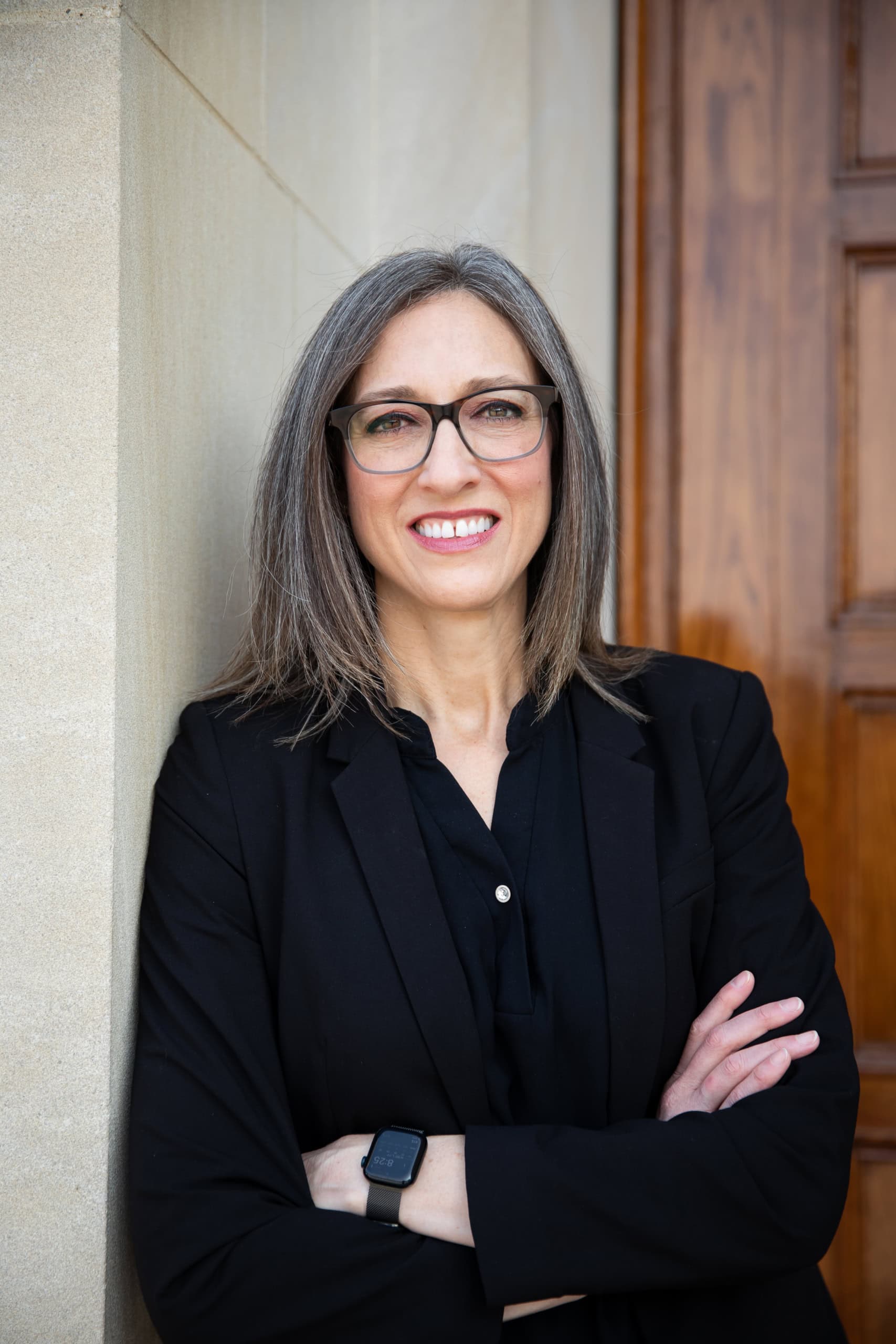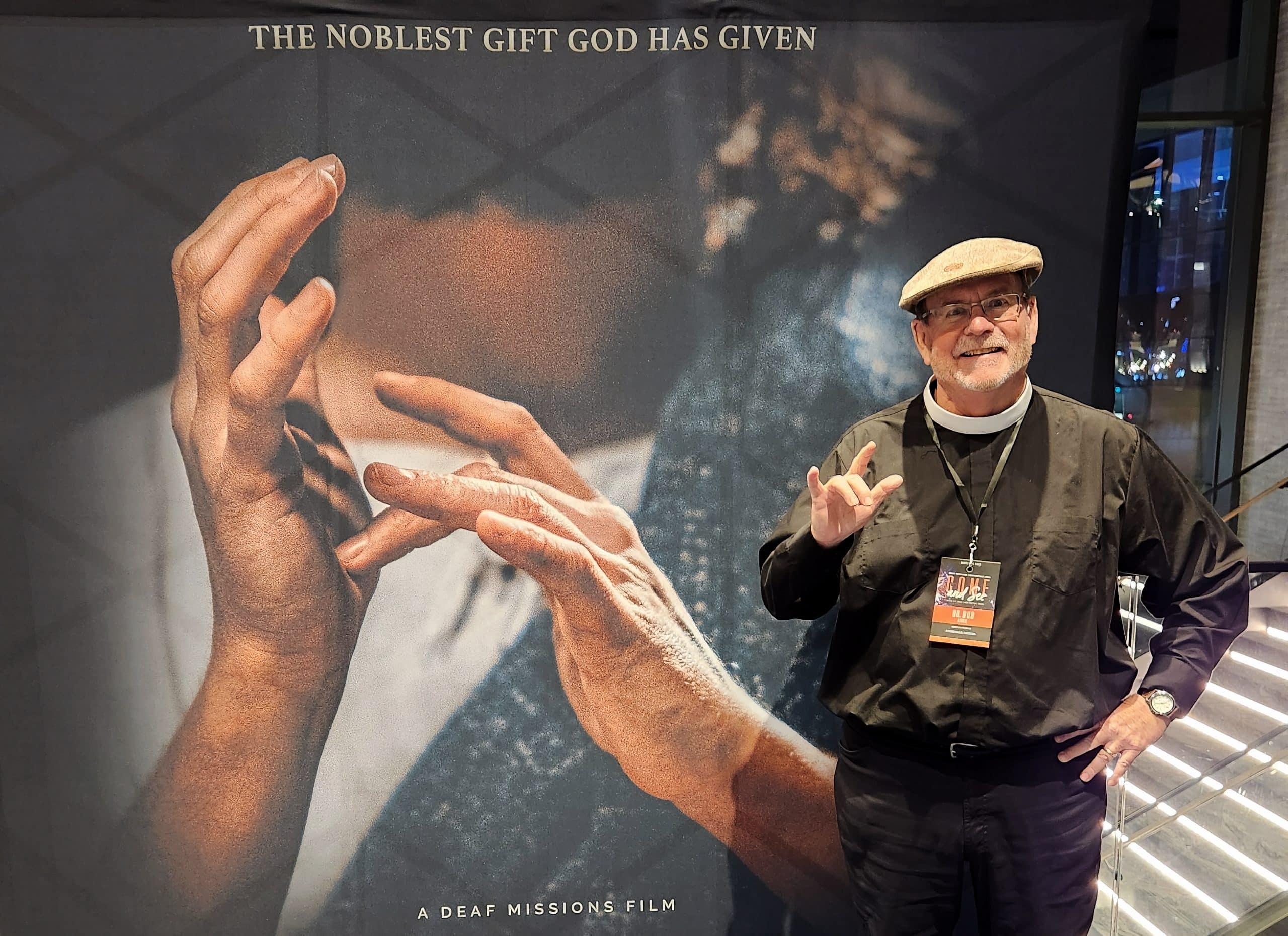The first time I stayed at a monastery wasn’t exactly for the most devout of reasons – I was touring as a songwriter in the United Kingdom and needed cheap lodging. Little did I know that my week at the abbey in the English countryside just south of Bath would set me on a journey of discovering ancient Christian devotional practices—and working to make them available to thousands of modern, everyday folks working real jobs and living real lives.
Those of you who have stayed at a monastery probably recall your first experience of their prayer times (aka the “offices”) quite clearly. The first office I attended was Compline. It had been a dreary, rainy English autumn day and I had arrived just a little before supper. I ate with the monks. One of them read aloud from a book certain to be older than the USA while the rest of us had our meal in silence.
As dinner ended, the dishes were cleared and we all rolled up our cloth napkins and slid them into our napkin rings. I and the other guests each had a little card with our name written on it. We slid that into the napkin ring as well and then stood up behind our chairs to chant the final mealtime grace.
On leaving the refectory, the other guest asked if I was going to Compline. I shrugged. It wasn’t so much a shrug that says “who knows” as it was a shrug that says “I’ve got no idea when, where, or how.” He whispered for me to follow him.
We walked along the corridor outside the refectory to a rather austere door into a dark tunnel lined with long, black robes of the most monkish sort. At the other end of the “tunnel” were some steps that led to a side entrance to the abbey chapel. It was dark. It smelled like candles were burning. But deeper down, there was the lingering scent of an earthy incense from other nights. Many, many other nights.
The place was empty except for the occasional shuffling feet of a black, hooded figure blinking the candles as he passed between us and them and then stopping at the center to bow and proceed up into the choir area.
I had been a Presbyterian just before dinner started. But now we sat down in that dark chapel. Aisle seats on the front row. Things were changing.
Prayers. What does it mean that the early church devoted themselves to the apostles’ teaching and the fellowship, to the breaking of bread and the prayers?
Some English versions translate this last phrase as “and prayers,” but the article should be there. It should be as it is above: “and the prayers.” One thing is sure though. It’s not simply being devoted to prayer, that is to say, just being a person or a people who is devoted to praying. When St. Paul tells us to pray without ceasing, he’s talking about our personal prayers. But this is talking about something different. This is talking about something we do together. This is talking about an activity that the Body of Christ does that effects changes in the world.
The silence in the chapel was broken when a lone voice chanted something haunting into the air. Then an entire squadron of voices chased up after it. It was all in Latin but I couldn’t even tell that for several seconds because sound was bouncing off all the walls from every direction. When I did realize it was Latin, the Presbyterian still left in me thought, “Come on guys, not everybody here knows Latin.” Then something quite life-changing occurred to me.
This wasn’t being done for me.
I know that shouldn’t be such a transformative thought. But I think that for a lot of us it might be. I think a lot of us come to God with our agendas, with the latest news of our lives, some desire concerning our own aims and ambitions for His Kingdom (which are usually quite different from actual concerns for His Kingdom). For many of us, our prayer life basically consists of telling God things that He already knows.
But perhaps prayer is something more, and, perhaps, it is a little less about me.
It is certainly making requests of our Father and sharing with Him our desires and dreams. But it is also an experience of God – Father, Son, and Holy Spirit. It is coming into a fuller communion with Him, a greater awareness of His presence. And… it is participating in His work.
As the monks continued chanting the psalm and their voices echoed from every corner of that chapel, I realized that the word of God was quite literally moving into the dark places of that building. The candlelight was transformed, the shadows, the stones of the building itself – the physical elements of the abbey were being filled, being inspired with the glory of God sent forth form the tongues of His people. This was Aslan singing the world into existence.
This is how our prayer affects the world. We speak truth, we speak life, light; as the Body of Christ, we speak God’s words into the dark places around us. We speak creative words into a decaying world. When the Church devotes herself to “the prayers” it is the beginning of mission.
Has it ever occurred to you that when you read a Psalm out loud you are participating in God’s word going forth from His mouth, and that word will not return to Him empty? There is power in your speaking the word of God aloud.
I think that it is important for us to understand that “the prayers” are part of God’s grace to us AND part of the work He is doing in the world around us. It is an action that transforms our lives as teachers, doctors, electricians, moms, and dads – it fills this life with the Life of Christ. It transforms us to be able to go out into the workplace to be salt and light in the world. Being devoted to “the prayers” is part of what makes all of our work to be sacred work. It is a sort of “christening” of all creation.
But what exactly are “the prayers?”
First of all, I probably should point out that there is no pure form of “the prayers” that we should try to recover. That point could easily get lost if you pay too much attention to the various English prayer book revisions over the last 500 years. Those revisions (when made with righteous motives) are to protect the theology of our prayer life and to ensure that we pass on to the next generation a faith that is consistent with the faith delivered to us from the previous generation.
What we do know is that as far back as we can tell, God’s people have prayed formally at two or three times of the day (see Psalms 55 & 141, Daniel 6). The Acts of the Apostles is full of references that the early church had at least three times of formal prayer – morning, noon, and evening (see Acts 2, 3, & 10).
So when we talk about “the prayers,” we’re simply talking about particular, formalized ways of speaking and hearing God’s word, offering Him praise and thanksgiving, laying our requests before Him, and interceding on behalf of the world.
Is using a particular form necessary?
Well, it’s not magic. So in that sense, no, it’s not necessary. However, if we want “the prayers” to be something that we do as the Church together, whether we are alone or gathered, then yes, perhaps a form is helpful. And maybe even more importantly, if we want “the prayers” to be a central part of our family life and the formation of our children into the likeness of their Savior, then probably a form is needed to help maintain “orthodoxy” – that is, being aligned with the theology of Christians throughout the ages since the time of the Apostles.
As Anglicans, we have what we call the “Daily Office” which consists of at least Morning Prayer and Evening Prayer – some add in Mid-Day Prayer and Compline as well. There was a time when nearly every Anglican lived within earshot of the church bell. During this now-gone era, it was both desirable and possible for the parish to gather together twice a day to offer prayer for the community and for the world. But of course we don’t live in that world now.
So how do we devote ourselves to “the prayers” in the 21st century?
I think there is an achievable vision for the Church to be a people devoted to “the prayers” in our modern society. It looks something like this: the parish gathers together at some frequency to offer “the prayers” together (e.g., Tuesday and Thursday Morning Prayer, Wednesday Evening Prayer). Meanwhile, “the prayers” are being offered daily (twice daily, ideally) by individuals, families, small groups, friend groups, bible studies, etc., throughout the rest of the week.
By having a common form, what I do alone in the mornings and with my family at the dinner table becomes connected to what I do with my community group on Tuesdays and with the whole Parish on Wednesdays. I’m no longer one guy offering a prayer (though I should be that as well), but now I am one guy offering “the prayers” at this time in this place while the rest of the church is offering “the prayers” in other places all across the city.
For the mission-minded church, some sort of corporate Daily Office is absolutely essential. Because it is not only a work we do through, with, and in our Lord, but it is a work that we incorporate others into as well. For a society that is starved for churches offering people something more than a conversion experience, as Anglicans we offer an inclusion into the
2,000-year-old intercessory work of the Body of Christ.
The Daily Office resources at TheTrinityMission.org, I think, are invaluable to helping us to re-claim this duty and devotion to “the prayers.” For those who have found the Book of Common prayer to be nearly indecipherable, The Trinity Mission offers books that lay out “the prayers” for each office each day of the week. It couldn’t be simpler. For those who need to baby-step their schedule into offering “the prayers” (i.e., pray on the commute or while washing the dishes), there is a podcast of Morning, Mid-Day, and Evening Prayer (8-15 minutes long).
These podcasts allow the newlywed couple working a first job in a new town far from friends and family, the single mom scraping for fifteen minutes of quiet before dawn, the octogenarian bed-bound in the nursing home, or anyone else who wants it to have the opportunity to pray the ancient prayers of our faith with another human voice.
Since that first trip to the monastery, I have made several more to other monasteries as well. At each one, I find basically the same thing going on: a group of people devoted to Jesus Christ and to the Scriptures that testify to Him. Through the offices, the monks are inundated with the very words of God daily – with His truth, with His love for His creation, and with His praises. It is a powerful thing to think of the spiritual battle being fought from these little bastions of prayer. But for me, it is a more encouraging thing to think of this battle being joined by every parish and Christian household throughout the world as they too devote themselves to “the prayers.”
By The Rev. Michael Thorne Jarrett. The Rev. Michael Thorne Jarret is the director of The Trinity Mission, which creates resources and opportunities for Christian formation and spiritual direction. You can join him and thousands of others in prayer each day through the Audio Daily Office podcast here.
This is an original story from The Diocese Churches for the Sake of Others. Visit their home page here. Photo credit to The Trinity Mission.






